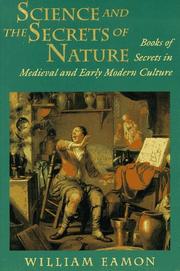Check nearby libraries
Buy this book

By explaining how to sire multicolored horses, produce nuts without shells, and create an egg the size of a human head, Giambattista Della Porta's Natural Magic (1559) conveys a fascination with tricks and illusions that makes it a work difficult for historians of science to take seriously. Yet, according to William Eamon, it is in the "how-to" books written by medieval alchemists, magicians, and artisans that modern science has its roots.
These compilations of recipes on everything from parlor tricks through medical remedies to wool-dyeing fascinated medieval intellectuals because they promised access to esoteric "secrets of nature." To popular readers of the early modern era, they offered a hands-on, experimental approach to nature that made scholastic natural philosophy seem abstract and sterile.
In closely examining this rich but little-known source of literature, Eamon reveals that printing technology and popular culture had as great, if not stronger, an impact on early modern science as did the traditional academic disciplines.
Medieval interest in the secrets of nature was spurred in part by ancient works such as Pliny's Natural History. As medieval experimenters adapted ancient knowledge to their changing needs, they created their own books of secrets, which expressed the uncritical, empiricist approach of popular culture rather than the subtle argumentation of scholastic science.
The crude experimental methodology advanced by the "professors of secrets" became for the "new philosophers" of the seventeenth century a potent ideological weapon in the challenge of natural philosophy.
Check nearby libraries
Buy this book

Previews available in: English
Subjects
Science, History, Experiments, Social aspects of Science, Philosophy, Medieval Science, Science, history, Science, medieval, Science, experiments, Science, social aspects, Science, philosophy, Magic, History, Early Modern 1451-1600, Sciences, Histoire, Sciences médiévales, Expériences, Aspect social, Magie, Illusion (performing art), Scienze, Storia, Saggi, Social aspects, Natuurwetenschappen, Geheimen, Philosophie des sciencesShowing 3 featured editions. View all 3 editions?
| Edition | Availability |
|---|---|
|
1
Science and the Secrets of Nature: Books of Secrets in Medieval and Early Modern Culture
2020, Princeton University Press
in English
0691214611 9780691214610
|
zzzz
Libraries near you:
WorldCat
|
|
2
Science and the Secrets of Nature: Books of Secrets in Medieval and Early Modern Culture
1996, Princeton University Press
in English
0691026025 9780691026022
|
zzzz
Libraries near you:
WorldCat
|
|
3
Science and the secrets of nature: books of secrets in medieval and early modern culture
1994, Princeton University Press
in English
0691034028 9780691034027
|
aaaa
Libraries near you:
WorldCat
|
Book Details
Edition Notes
Includes bibliographical references (p. [431]-479) and index.
Classifications
External Links
The Physical Object
ID Numbers
Community Reviews (0)
Feedback?History
- Created April 1, 2008
- 14 revisions
Wikipedia citation
×CloseCopy and paste this code into your Wikipedia page. Need help?
| July 25, 2024 | Edited by MARC Bot | import existing book |
| March 8, 2023 | Edited by MARC Bot | import existing book |
| July 23, 2022 | Edited by ImportBot | import existing book |
| November 16, 2020 | Edited by MARC Bot | import existing book |
| April 1, 2008 | Created by an anonymous user | Imported from Scriblio MARC record |










